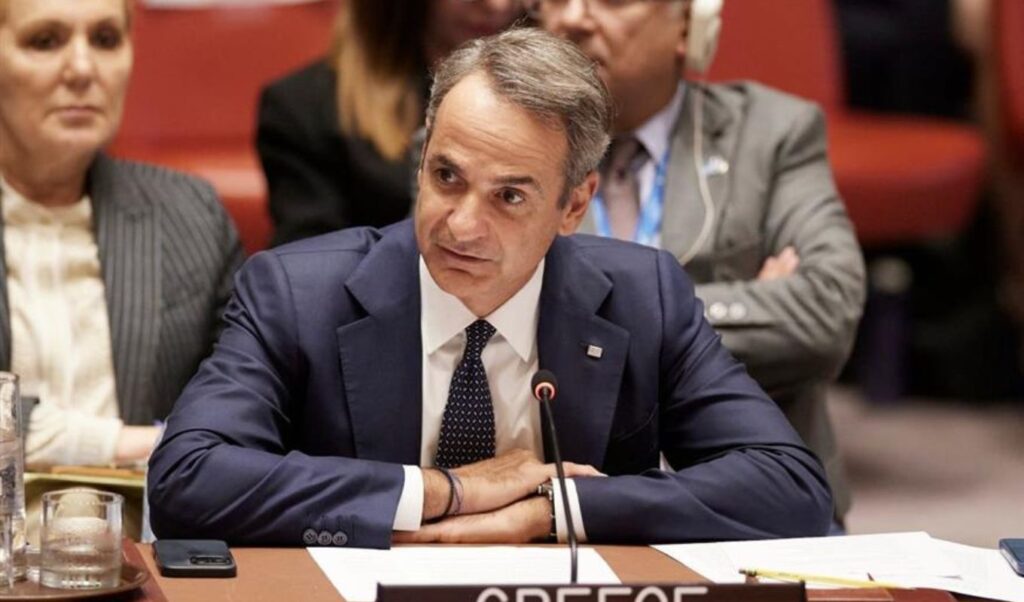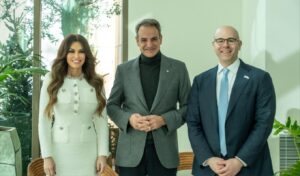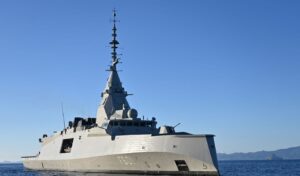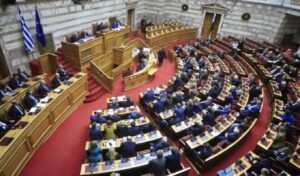Kyriakos Mitsotakis spoke at a high-level event of the UN Security Council, organized by the Korean Presidency on the theme “Artificial Intelligence and International Peace and Security.” Speaking in New York, during the High-Level Week of the 80th General Assembly, he emphasized both the opportunities and risks of artificial intelligence (AI), insisting that global governance must ensure that technology “will serve peace, human dignity and humanity’s highest aspirations.”
Prime Minister Mitsotakis began by congratulating South Korea for organizing the session, connecting it to previous actions. “Today’s discussion builds on the informal Arria-formula meeting that Greece co-organized last April with France and the Republic of Korea” he noted. He also emphasized that recent summits in The Hague and Seoul, the US Political Declaration on responsible military use of Artificial Intelligence, and the Paris Summit “contributed to developing rules, regulations and guidelines for responsible development and use of artificial intelligence, including the particularly sensitive military sector.”
The Prime Minister stressed that Artificial Intelligence is not “simply another tool,” but a general-purpose capability that can either enhance peace or destabilize. “In the right hands, it can strengthen peacekeeping, improve early warning systems, accelerate humanitarian aid… In the wrong hands, it can fuel disinformation, intensify cyberattacks and lower the threshold for escalation and conflict,” he noted. By its nature, he added, Artificial Intelligence is “a dual-use technology, and this means our collective security increasingly depends on the choices we make.”
Mitsotakis connected the issue to historical regulatory examples, arguing that just as institutions were created in the past for nuclear energy and arms control, so now “we must develop new mechanisms to ensure that innovation in artificial intelligence enhances not only peace and security but also human dignity.” This, he emphasized, requires “international cooperation, transparency and renewed commitment to the principles of the United Nations Charter.” Recognizing security realities, he warned that malicious actors are moving fast: “If we want to protect our citizens, maintain our deterrent capacity and ensure stability, we too must invest responsibly in AI applications for defense and security — but always in accordance with international law and with a commitment to human oversight.”
Mitsotakis: “Our choices will determine whether technology becomes a force for progress or a lever of threat“
He emphasized that this “is not a call for a new arms race, but recognition of the fact that peace is difficult to achieve, harder to safeguard and most difficult of all to maintain.” The prime minister characterized the present moment as decisive. “We are at a turning point. The choices we make regarding AI will not only redefine the balance of power, but will also determine whether technology becomes a force for humanity’s progress or a lever of threat” he stressed.
He called on the Security Council to rise to the occasion, as it did in the nuclear age. “The Council must now respond to manage the age of artificial intelligence” he stated. “Greece believes that the United Nations has the historical responsibility to chart a course where innovation enhances peace, responsibility tempers power and technology serves humanity’s highest aspirations.” He warned against allowing AI to become “a source of rivalry and division,” but instead to constitute “a cornerstone for a safer, fairer and more peaceful world.”




